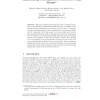Free Online Productivity Tools
i2Speak
i2Symbol
i2OCR
iTex2Img
iWeb2Print
iWeb2Shot
i2Type
iPdf2Split
iPdf2Merge
i2Bopomofo
i2Arabic
i2Style
i2Image
i2PDF
iLatex2Rtf
Sci2ools
140
click to vote
MOZ
2004
Springer
2004
Springer
Implementing Semiring-Based Constraints Using Mozart
Abstract. Although Constraint Programming (CP) is considered a useful tool for tackling combinatorial problems, its lack of flexibility when dealing with uncertainties and preferences is still a matter for research. Several formal frameworks for soft constraints have been proposed within the CP community: all of them seem to be theoretically solid, but few practical implementations exist. In this paper we present an implementation for Mozart of one of these frameworks, which is based on a semiring structure. We explain how the soft constraints constructs were adapted to the propagation process that Mozart performs, and show how they can be transparently integrated with current Mozart hard propagators. Additionally, we show how over-constrained problems can be successfully relaxed and solved, and how preferences can be added to a problem, while keeping the formal model as a direct reference.
Artificial Intelligence | MOZ 2004 | Mozart Hard Propagators | Several Formal Frameworks | Soft Constraints |
Related Content
| Added | 02 Jul 2010 |
| Updated | 02 Jul 2010 |
| Type | Conference |
| Year | 2004 |
| Where | MOZ |
| Authors | Alberto Delgado, Carlos Alberto Olarte, Jorge Andrés Pérez, Camilo Rueda |
Comments (0)

